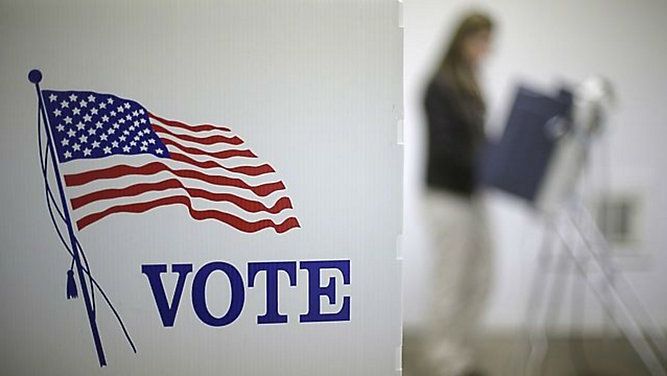Democrats in the New York state legislature opened their 2019 session Monday by approving a slew of voting reforms, including early voting, that the previous Republican-controlled state Senate had blocked.
"There are a lot of people walking around the capital today very confused because they're saying, 'Wait a minute, this is the first day! Nothing gets passed on the first day!" Queens State Sen. Michael Gianaris, the state Senate deputy leader, said at a news conference. "Well, you better get used to it. Because something is going to pass today, something is going to pass tomorrow, something's going to pass next week, then the week after, and the week after that, and the week after that."
- New York Government Guide: Learn more about how state government works, and how to keep track of legislation.
WHAT VOTING REFORMS DID THE LEGISLATURE APPROVE?
- Early voting that would require counties to allow New Yorkers to vote in person up to 10 days before an election.
- Holding all state primaries in June instead of September.
- Preregistering 16- and 17-year olds when they sign up for a driving permit so they would automatically be registered when they turn 18.
The bills passed both chambers easily and with bipartisan support. The measure now goes to Gov. Andrew Cuomo, who supports the idea.
Opponents — mostly Republicans — questioned the added cost of manning polling places for 10 days and said early voting could create opportunities for double voting or other fraud.
"Is this bill the first step to allowing non-citizens to vote in New York?'' asked Republican Sen. Catharine Young of Olean, who said she also worries that early voting will be a financial burden for local governments.
Local governments don't have the money to pay for the costs associated with in-person early voting and are asking Cuomo and lawmakers to add funding in the next state budget, according to a statement from the state association of counties.
Supporters say early voting will increase turnout and reduce lines on Election Day. New York was among the worst 10 states for turnout in both the 2016 and 2018 elections, continuing a long trend of lower-than-average voter participation.
Meanwhile, federal primaries, like those for Congress, are currently held in June in New York, followed by state primaries in September and the general election in November. Combining the primaries in New York would not take effect until 2020.
Republicans have expressed concerns that some lawmakers would be absent at the end of the legislative session, which goes deep into June, if the primary date moves to the same month. Their argument is that some lawmakers may be in their home districts campaigning instead of being in Albany for the end of session.
WHAT VOTING REFORMS NEED A CONSTITUTIONAL AMENDMENT?
The legislature is beginning the process of passing constitutional amendments for:
- Same-day voter registration.
- No-fault absentee ballots to allow people to vote by mail.
Possible constitutional changes must pass the legislature twice before going to the voters, meaning those questions could not appear on a ballot until at least 2021.
A RAPID TIMETABLE FOR LEGISLATION
In previous years, lawmakers usually did note vote on significant bills until the budget, which is due April 1, was hammered out.
Things are different this year, however, because Democrats control both the state Assembly and Senate. The party won the Senate in November elections, and by a comfortable margin. Only 32 Senate seats are needed to form a majority, but Democrats have 39 members, which makes passing legislation much easier. In the Assembly, Democrats hold 106 of 150 seats.
The bills expected to pass in the Senate match the ones in the Assembly, meaning they can reach Gov. Andrew Cuomo's desk immediately. He would then have 10 days to sign them into law.
Cuomo is slated to lay out his budget and agenda in his State of the State address Tuesday afternoon, but it is possible that state lawmakers will pass the policy proposals in Cuomo's budget long before the end of March.
CAMPAIGN FINANCE REFORM
The legislature also took up a bill Monday to close the limited liability company (LLC) loophole, which allows corporations to make unlimited political contributions. But critics say the bill doesn't go far enough.
"We have been, as you know, for years saying this is one of the things that we can do immediately," State Senate Majority Leader Andrea Stewart-Cousins said.
Lawmakers say they will likely take up a more comprehensive package of campaign finance reforms in the next few weeks, although they did not provide an exact date. That will likely include a component of public financing of elections.
OTHER PRIORITIES FOR DEMOCRATS IN ALBANY
Among the other bills that Democrats may pass in this session include legalizing recreational marijuana, codifying Roe v. Wade in the state, and congestion pricing.
On marijuana, lawmakers would have to decide how many retail shops should be allowed, how they should be licensed and regulated, and the appropriate tax rate for the product.
On congestion tolls, they need to determine which vehicles to charge, whether discounts should be given to local businesses or low-income commuters, and how to best use the revenue to support upgrades to New York City's aging subways.
The six-month session includes 61 scheduled days of legislative activity.
Information from the Associated Press was used in this story.



